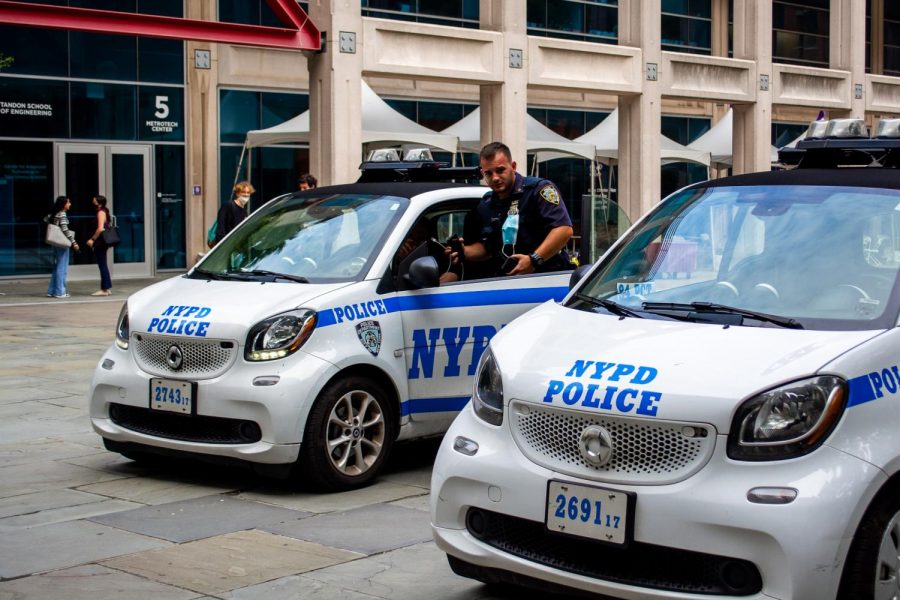Opinion: NYPD officers must be held legally accountable
Recent findings of NYPD officers’ misconduct underscore the importance of strict disciplinary accountability.
On Oct. 18, New York’s police watchdog agency recommended 65 officers be charged with misconduct. In order to hold police officers accountable, the NYPD commissioner should not have the final say in the disciplinary hearings. (Staff Photo by Manasa Gudavalli)
October 28, 2021
On Oct. 18, in response to an ongoing investigation into over 300 filed complaints of police brutality during the Black Lives Matter protests from the summer of 2020, New York’s police watchdog agency recommended that 65 New York City Police Department officers be charged with misconduct. The Civilian Complaint Review Board also recommended that 37 of those officers face the highest level of discipline, with potential penalties of suspension or termination.
While this may seem like a step toward more accountability, the NYPD commissioner has the final say for all these disciplinary hearings. With no legal structure binding the NYPD to its disciplinary policies, the preservation of the commissioner’s discretionary powers highlights mayor Bill de Blasio’s failure to stand by his commitment to police accountability. The city government must hold officers accountable by granting the CCRB the final authority to decide on officer misconduct and disciplinary penalties.
De Blasio has continuously pointed to the NYPD’s new disciplinary matrix and its accompanying memorandum of understanding. The matrix, spanning 54 pages, explains penalty guidelines and addresses violations such as excessive force, abuse of authority, offensive language and false statements. CCRB chair Rev. Fred Davie echoed his faith in the matrix and MOU, citing their roles in supplying the CCRB with the information essential to reaching disciplinary decisions on police. NYPD spokesperson Sgt. Edward Riley also issued a statement emphasizing the NYPD’s progress, saying, “The NYPD has made significant strides and continues to work toward making our disciplinary processes transparent.”
Despite these affirmations, critics point to how both the matrix and MOU lack any legal power — they are simply non-binding recommendations. The CCRB lacks any legal authority to compel the NYPD to follow its matrix or MOU, undermining the mayor’s professed dedication to misconduct accountability.
“Mayor de Blasio and the NYPD continue to push a fairytale around NYPD discipline,” Kesi Foster, a spokesperson for Communities United for Police Reform, said to NY1. Last year, the New York Civil Liberties Union database published a full record of misconduct claims filed by civilians with the CCRB since 1985. Of over 323,000 total complaints, under 3 percent resulted in officers being penalized, with only 12 being terminated. 0.1% of police killing cases in 2020 ended in conviction.
Time and time again, police unions have resisted reform efforts through collective organization to protect their own, even funding legal representation for accused cops, guaranteeing pay for the suspended and passing over allegations and recommended disciplinary actions. During a BLM Protest in June 2020, two police officers in Buffalo, NY forced 75-year-old protestor Martin Gugino to the ground, fracturing his skull and stranding him on the sidewalk bleeding and immobile. Despite clear video footage, the Buffalo Police department avoided accountability and originally claimed Gugino had tripped of his own accord.
Further criticism of the matrix and memorandum includes their potential to provide avenues for officers guilty of misconduct to retire or resign with benefits instead of facing termination. The matrix outlines several mitigating factors that, at the commissioner’s discretion, can excuse officers from facing full penalties. Some factors, such as “the area of law or policy implicated in the matter”, “positive employment history”, or “the potential for rehabilitation” could prove vulnerable to the commissioner’s subjectivity.
In order to address the police misconduct plaguing our city and stand by the impartiality of disciplinary action, NYC government must equip disciplinary structures with legal authority and strip the police commissioner’s power of personal discretion. Considering de Blasio’s upcoming exit from office, the next mayor must dismantle the power of the commissioner’s final say and grant the CCRB the legal authority to hold NYPD officers accountable.
Contact Michelle Han at [email protected].

























































































































































